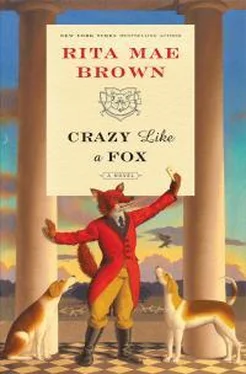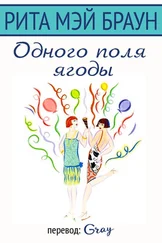She smiled. “I am off men.”
Margaret, who knew of the divorce thanks to Vic Harris’s stupid media attack on his wife accusing her of deserting him, simply said, “Every woman says that at some time in her life. Ah, there’s my fella.” She waved to Ben. “He’s the sheriff.”
Yvonne blinked. She’d heard about the DuCharmes. Tootie had filled her in as best the young woman could. Here was someone from a once powerful family, a family that made its fortune in 1812, dating a sheriff?
She couldn’t help herself. “I thought Virginians were, well, Tootie went to Custis Hall and—”
“Snobs.” Margaret shrugged as she cut on the motor. “You can find them anywhere. Things have changed here. I’ve seen a lot of change and I’m in my early forties. Dad talks about it. Says it really started after World War Two. Mostly it’s for the good.”
“I hope that’s true everywhere, but I don’t know. All this divisiveness.”
“Media. All media-driven, I swear.” Margaret then gulped. “Sorry, you and your ex own a magazine, TV channels.”
“You don’t have to apologize. Bad news sells.” She half smiled. “There’s something in the human animal that loves misery, so long as it’s happening to other people.”
“Ain’t that the truth!” Margaret crept about fifty yards behind Sara Bateman’s and Gray’s cars. “I know you know a little bit about hunting because of Tootie. But I’ll give you my running commentary, and as we pass things I’ll tell you what they are or were. When the hunt is over I’ll show you the big house—well, the foundation for the big house—and I’ll show you the dependency where Dad and I lived and the duplicate where my uncle and his wife lived, not close together but you’ll get the idea. In the nineteenth century, up until the 1920s, this place had two hundred and fifty people working on it.”
“Dear God. I can’t imagine the payroll.”
“Fierce, but you could make money in agriculture then. People were housed as part of their compensation. Now that doesn’t count. Minimum wage is as though everyone works in cities. Most of the workers lived in clapboard houses scattered around the five thousand acres. And given that Norfolk and Southern eventually came through this area, that just bumped up business.”
“The 1920s?”
“Depression after World War One. And the influenza epidemic. Hurt everyone everywhere, I think. The economy began to improve, but young people trickled away. After World War Two the trickle became a flood and Dad said the G.I. Bill, wonderful though it was, lured men from farming.”
“I’m not strong on history.”
“I’ll make up for that.” Margaret grinned. “What a voice. Asa. Oh, now everyone’s on it and good news, Crawford’s hounds are right there. He’s gone through huntsmen like potato chips; the pack has been one riot after another. Hired this lady last year and for whatever reason, he listens to her, and to his wife. Miracles do happen.”
Yvonne, window open, listened. The sound of hoofbeats was now deafening. Blended with two packs of hounds on full throttle she felt the hair on the back of her neck stand up. She would join them someday, whatever it took. This must have been what a cavalry charge sounded like.
Slowly driving toward them from the opposite direction was a young man, broad beard trimmed, baseball cap squarely on his head. The old Rangler, large spots with paint rubbed off, had seen better days, but it was running. The bed was filled with fence boards. He smiled and waved as he approached, then slowed.
“They’re on fire. Thought I’d better get out of the way.”
Margaret smiled. “Sounds great, Hank.”
He passed, and she continued slowly. She knew some of the workers and he was gentlemanly, knew hunting, and worked very hard.
The combined packs hooked toward Chapel Cross, the intersection now three miles east, and a mile after that the railroad tracks, Tattenhall Station.
Hounds poured over the fence onto the road, called, obviously, Chapel Road.
Skiff took the sturdy black painted coop first, landing in the grass strip along the road. Shaker followed. Hounds sped across the tertiary road and blew through Binky DuCharme’s Gulf station, the sign from the 1950s still hanging and intact. With no fences to impede them, hounds picked up speed, churning onto the front lawn of the chapel where they stopped.
“Try the graveyard,” Reuben, one of the Dumfrieshire hounds, suggested.
The field clattered up, halted. Tricolor Jefferson Hounds and black and tan Dumfrieshire hounds worked together through the graveyard.
Diana knew this territory from her youth. She sat to study the terrain. No mud puddles offered quick kills to scent. The ditch by the road, when wet, also gave a fox the chance to slip away, baffle the pursuit.
Noses down, hounds diligently worked the immaculately kept graveyard. A whine here and there testified to their frustration. The two huntsmen, on the edge of the graveyard, where many markers were two centuries old or more, kept still and quiet. Let the hounds work it out. They could pack them up and move off soon enough.
Parker, young, came up to Diana. “How does the fox do that?”
She replied, “I think I know. Follow me.”
Dutifully following his idol, Parker returned to the graveyard, walked past it to a filled wheelbarrow at the edge. The sexton, Adolfo Vega, upon hearing the hounds, had left his chore, returning to his house to wait it out. While he liked the hounds fine he didn’t want to be in the middle of them, or even worse, the riders.
Diana backtracked to the road where they lost the scent. Asphalt or packed dirt holds scent so long as there’s moisture in the air and it’s coolish, but the temperature was now in the mid 50s. Not impossible but not great.
“He walked down the road, turned to the chapel. Put your nose down. Faint and fading,” Diana ordered.
Wanting to make a show, Parker opened his mouth.
“Don’t you dare,” she reprimanded him.
“But he’s been here. He turned here.”
“Use your head, Parker. If you open everyone will rush here, and then what? This is a smart, smart fox. Just follow me.” She walked to the wheelbarrow. “We don’t want everyone fouling what little scent there is.”
The other hounds hadn’t given up, but they had checked every inch in that graveyard.
From the wheelbarrow, Diana took one stride to the first tombstone. Then the next. Parker watched, astonished.
“On top of the tombstones,” she sang out as she stood on her hind legs.
In a flash every hound there ran to a tombstone. They opened one by one.
Diana, in the lead, reached the easternmost boundary of the graveyard. Woods marked the end of the chapel property and the beginning of Orchard Hill.
The fox didn’t use the woods. Instead, Diana still working intensely, he jumped from tombstone to tombstone at the graveyard’s edge, then with a mighty leap hit the ground, ran straight to the road, and there again scent became difficult.
Betty Franklin, now on the southern side of the intersection, didn’t move. Hounds slowly walked toward her, working the grassy edge. Diana, in the lead, Parker fighting for his place next to her, moved deliberately.
“He had to get off this road sometime,” she advised the youngster.
Ardent, right behind, working in tandem with Reuben, agreed. “He didn’t go to Tattenhall Station. Dragon and Dreamboat ran over there to check. That s.o.b. is using the road.”
Sister turned Lafayette’s head toward the west. Crawford followed suit as did the field, still waiting patiently. The sight of hounds on their hind legs, literally walking with the scent, excited the people about as much as a terrific run.
Читать дальше












